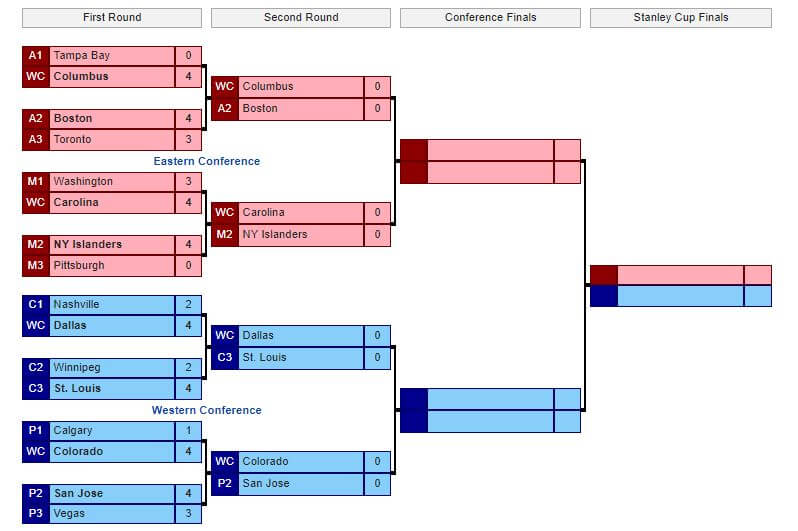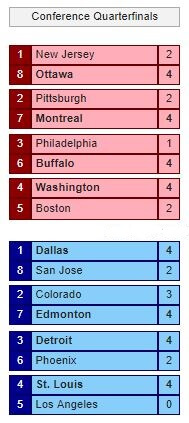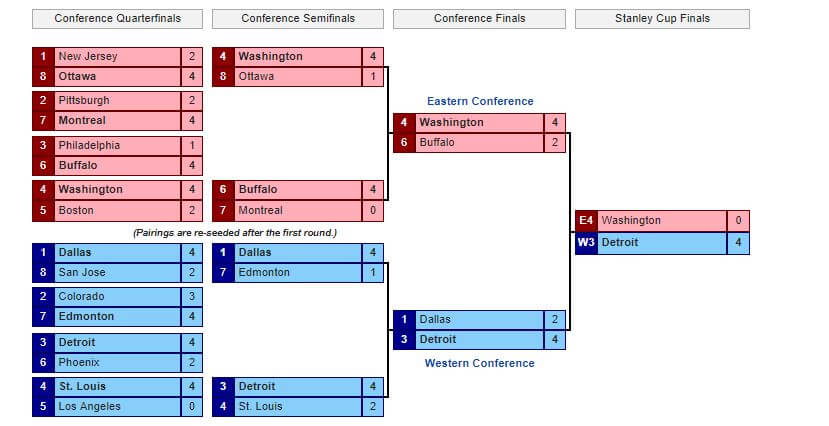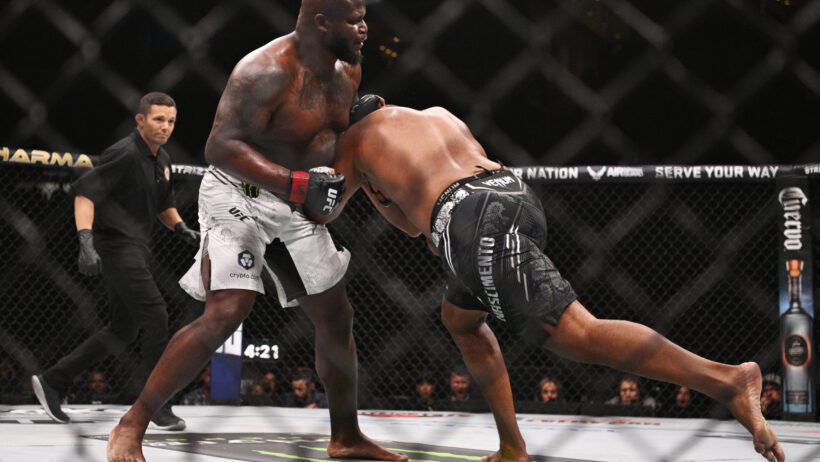Do First-Round Playoff Upsets Signal a Longshot 2019 Stanley Cup Winner?
By Sascha Paruk in NHL Hockey
Updated: March 23, 2020 at 2:42 pm EDTPublished:

- The top-four seeds all lost in the first round of the 2019 NHL playoffs
- That’s never happened before in the 16-team postseason era
- What can bettors learn from the last time the playoffs featured a similar number of first-round upsets?
The first round of the 2019 playoffs produced an unprecedented number of upsets. The top-four seeds all fell — Tampa Bay, Washington, Calgary, and Nashville — and five of eight lower-seeded teams advanced in total.

It’s not unprecedented for one half of the bracket to be turned on its head: in 2010, back when each conference still had three divisions, all three division-winners in the East lost in the first round. The same thing happened in the West in 2006. But in both of those years, all three division-winners advanced in the other conference.
Indeed, in the 16-team playoff era (which dates back to 1980), never before have all of the top-four seeds been ousted in round one. In fact, it’s been over 20 years since even three of the top-four overall seeds lost in the first round.
[I]n the 16-team playoff era (which dates back to 1980), never before have all of the top-four seeds been ousted in round one.
The closest the NHL playoffs have come to this level of chaos was all the way back in 1998, a year when Dominik Hasek won the Hart Trophy, Steve Yzerman won the Conn Smythe, and a bright-eyed Joe Thornton was the #1 pick in the draft.
It’s not possible to draw sweeping conclusions from one playoffs over 20 years ago, but scrutinizing what happened that year may give bettors some pause in backing a big underdog going forward.
The Chaotic First Round in 1998

As you can see from the image to the left, three of the top-four seeds lost in the first-round in 1998: New Jersey, Pittsburgh, and Colorado. Only the Central-winning Dallas Stars advanced.
With an NHL-leading 109 points and +75 goal difference, the Stars were the closest thing that 1998 had to this year’s Tampa Bay Lightning. But those numbers are a far cry from what Tampa did in the 2018-19 regular season (128 points, +103 goal difference).
Tampa Bay’s four-game sweep at the hands of the Columbus Blue Jackets is arguably the biggest playoff upset ever. The Lightning were a -375 favorite to advance. That’s an implied probability of 79%!
Based on the series prices for the four big underdogs that advanced — Columbus (+315), Carolina (+128), Colorado (+200), and Dallas (+160) — there was a 1.3% probability of all four winning in the first round.
Add in the New York Islanders, who were actually +125 underdogs against Pittsburgh despite having home-ice advantage, and the probability goes down to 0.6%.
If you had wagered $10 on a parlay with those five underdogs, you’d be sitting on a cool $1,650 right now.
Does that mean bettors should rush to the window and parlay the underdogs in round two? Not if 1998 is instructive.
The Rest of the 1998 Playoffs Were Chalky
Looking at the rest of the 1998 playoff bracket, it’s plain to see that the biggest underdogs weren’t long for this world.
In round two, all four higher-seeded teams advanced: Washington, Buffalo, Dallas, and Detroit.
The higher seed would go on to win two of the final three series, as well.

The Stanley Cup finals were an absolute whitewash. The powerhouse Red Wings, who had swept the Flyers in the finals the year before, obliterated the upstart Capitals. The final scores weren’t all that lopsided (2-1, 5-4 (OT), 2-1, and 4-1), but Detroit scored first in every game of the series and outshot Washington 163-99 in total.
Heading into the second round in 1998, Detroit and Dallas were far and away the strongest teams remaining based on regular-season performance. Detroit had finished third in the NHL in both points (103) and goal difference (+54). As mentioned, they were also the defending Stanley Cup champions and had a stellar 25-8-8 regular-season record at Joe Louis Arena.
Which of the Remaining 2019 Teams Are the Strongest?
Heading into round two, there is only one team that profiles like Detroit circa 1998 in comparison to the rest of the field: the Boston Bruins.
The Bruins finished tied for second in the regular season with 107 points, had the third-best goal difference at +44, and owned the second-best home record at 29-9-3. Every team that finished ahead of or tied with them in any of those categories is now out. While they dropped two home games to the Leafs in round one, they put in a decisive performance at TD Garden in Game 7.

It is tempting to put the Sharks, the highest remaining seed in the West, in the same boat as the Bruins; but they were six points worse in the regular season (101), only had a +28 goal difference, and were not as good on home ice (25-11-5).
They also lost captain Joe Pavelski to a very scary injury in Game 7 versus Vegas. Health is key to a deep playoff run, as any NHL coach will tell you.
Based on the above, it’s no surprise that the Bruins have emerged as the outright 2019 Stanley Cup favorites among the final eight teams. The Bs odds currently range from +350 to +450 as of Thursday morning (Apr. 25).
2019 Stanley Cup Futures: Prior to Round Two
| Team | Odds |
|---|---|
| Boston Bruins | +450 |
| San Jose Sharks | +500 |
| St. Louis Blues | +600 |
| Columbus Blue Jackets | +600 |
| New York Islanders | +600 |
| Carolina Hurricanes | +700 |
| Colorado Avalanche | +700 |
| Dallas Stars | +750 |

Managing Editor
Sascha has been working in the sports-betting industry since 2014, and quickly paired his strong writing skills with a burgeoning knowledge of probability and statistics. He holds an undergraduate degree in linguistics and a Juris Doctor from the University of British Columbia.



